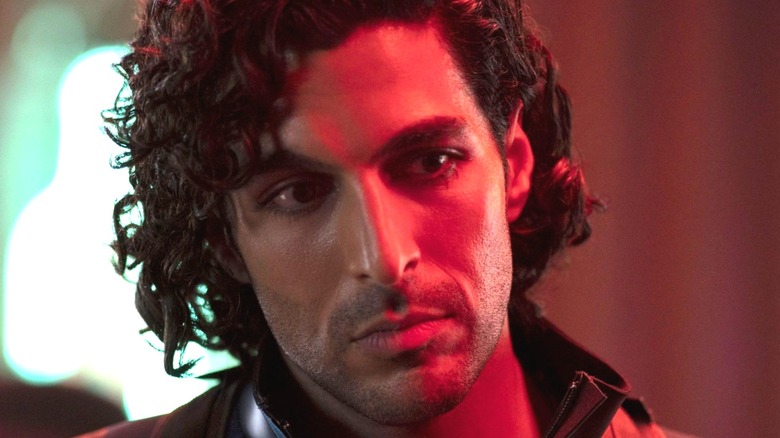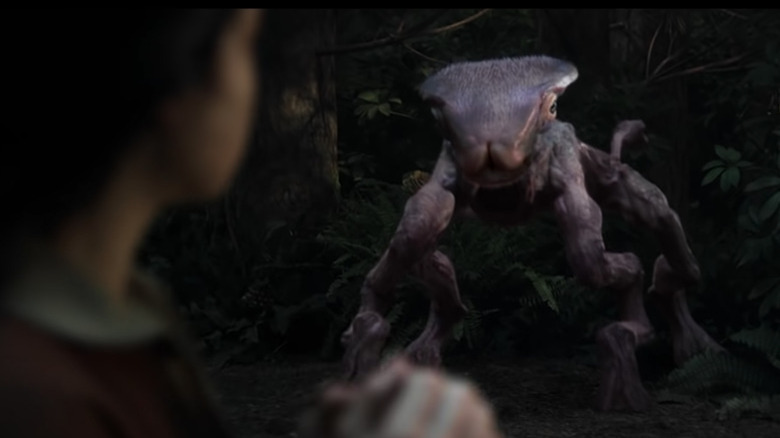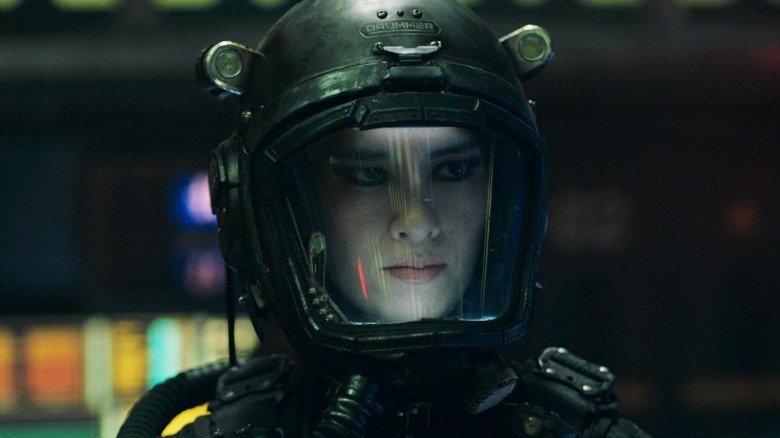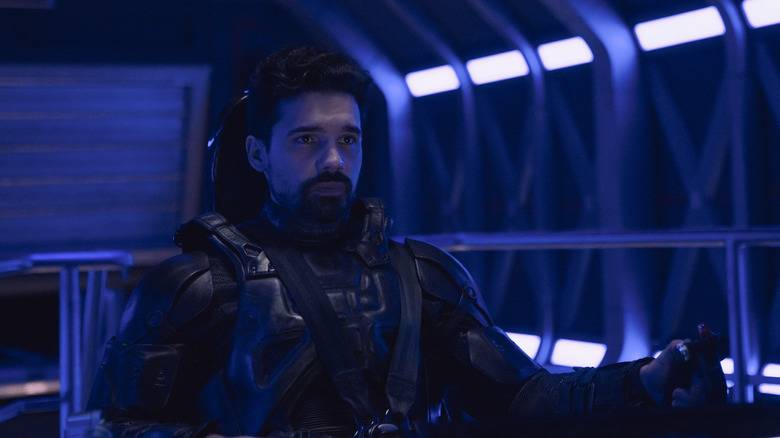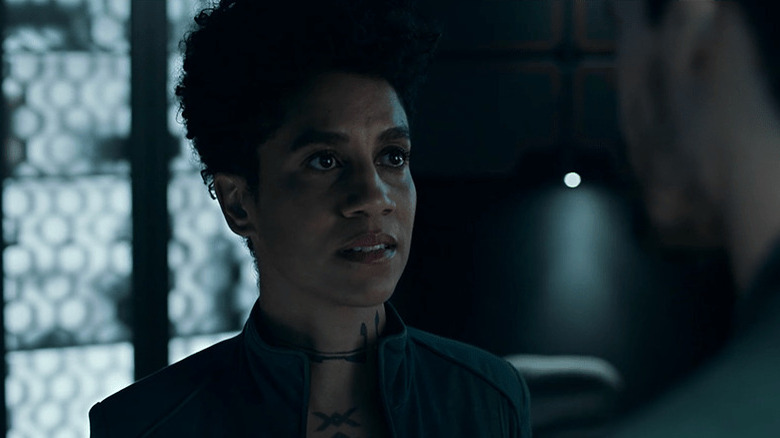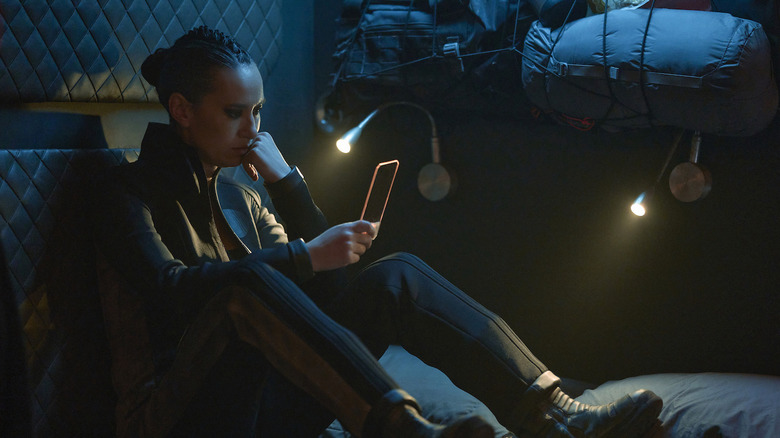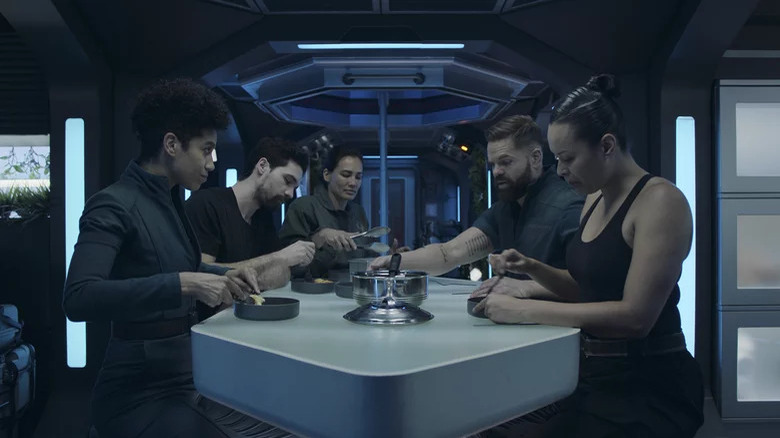Every Episode Of The Expanse Season 6 Ranked Worst To Best
After a six-season run — three on Syfy, followed by another three on Prime Video — it was difficult to imagine "The Expanse" finding resolution in its infinite space. Based on the novel series by James S. A. Corey (a pseudonym for Daniel Abraham and Ty Franck, who also helped write and produce the show), the series' expansive universe had spun so many story threads that tying it all up seemed nearly impossible. In addition, Abraham and Franck told Polygon that the season 6 finale was more of "a natural pause point" for the story than a real ending, and the resulting season is a tantalizing mixture of definitive conclusions and unanswered questions.
Whether the conflicts were microscopic or monumental, "The Expanse" excelled in fleshing out the relationships between both geopolitical forces and individuals, with the crew of the Rocinante serving as its emotional crux. When season 6 begins, the main antagonist remains the ever-ruthless Marco Inaros, whose Free Navy is unleashing terror on both the Inners as well as the Belters he claims to protect. The Rocinante has joined the fight on behalf of the Inners, while the Belter outlaw Camina Drummer has broken free from Inaros' grip and is losing her beloved crew one by one. And that's not even getting into the bizarreness on Laconia, a newly settled planet in the Ring where a young girl has an adventure that recalls "Pet Semetary."
Given all of that material, how well did "The Expanse" end? Was justice done for each Earther, Martian, and Belter? Was every chapter of this final season satisfying? Ranking the final season of such a heavily serialized show is challenging, but we've given it our best shot, listing all of "The Expanse" season 6 episodes from worst to best.
6. Strange Dogs
While there's not a poor episode in this season, season premieres don't need to exceed the ones that come after, either. Propelling both the plot and the characters towards the battleground, "Strange Dogs" cuts to the chase and lays down the psychological stakes for the season. After a cold opening on Laconia, the episode sets the tone with footage of Earth's ruined agriculture as U.N. Secretary-General Chrisjen Avasarala ruminates on the hopelessness of the ravaged land.
Having lost most of her crew members and romantic partners due to Inaros' violence and her controversial responses, Camina Drummer shoulders a new load of heartbreak, deciding to part ways with a beloved but inexperienced crew member after she proves unsuited for war. Aboard the Pella, Marcos and Naomi's son Filip isn't doing so well either, and has begun to question his role in the mass murder despite putting on a macho front. From the personal (Amos' uncertainty about his role in the war, Filip's guilt, Camina's many losses, Clarissa's uneasy settling-in) to the grand (the galactic food crisis), "Strange Dogs" wastes no time in raising issues that don't have easy answers.
5. Force Projection
The third chapter of season 6 introduces many new dilemmas. Filip questions why Marco, the man with Belter pride, has abandoned the Belters on Ceres to the mercy of the U.N. The U.N. itself is facing a humanitarian crisis, having no resources to aid Ceres and its agitated Belter population.
"Force Projection" places low on this ranking because it launches a fresh story thread with hit-or-miss results. When the Rocinante is pulled into a suspenseful battle with Inaros' ship, the Pella, Holden catches a glimpse of Naomi's son Filip on the monitor. That's all that it takes for Holden to secretly disable the missile shot by Bobbie Draper, saving both Filip and Marco's lives. In the moment, it's an understandable human reaction, but Holden's decision has some unexpected aftershocks. On one hand, Holden's choice informs much of the interpersonal drama of the next three episodes. On the other, its tension fizzles out. While there is some emotional payoff (see Naomi's actions during the finale), Holden never faces any lasting psychological or personal consequences for his decision.
In addition, "Force Projection" confirms that Marco Inaros isn't the strategic mastermind he's made out to be. As a villain, he's also a little generic, despite Keon Alexander's growling performance and the script's best attempts to flesh out Marco's personal complexities, his self-rationalized hubris, and the constant reminders that this mass murderer is a product of failed system.
On a more superficial note, cameos from Amos' bestie Prax, whose research might hold the key to solving Earth's starvation problem, and Pastor Anna Volovodov, who is seen offering consoling words to her fellow Earthers, are very welcome.
4. Azure Dragon
"Kinda nice, everyone being on the same side for once?" a man muses as he delivers munitions to the Rocinante. Amos sarcastically agrees. In the season premiere, everyone was already exhausted, and the second episode of the season, "Azure Dragon," doubles down by ramping up the interpersonal anguish. As Amos' grumbling response proves, everyone on the Rocinante may technically be on the same side, but they're not all on the same page. In a thematically connected subplot, Filip begins to doubt what he's fighting for, especially when his sense of honor is further compromised by his father, who sweeps Filip's tantrum-induced shooting under the rug.
Through a satisfactory stew of interactions, "Azure Dragon" demonstrates why we like watching the Rocinante crew (including honorary members, like Bobbie Draper) mingle. Draper is stationed aboard the Rocinante by Avasarala, butting heads with Holden as they embark on a mission to steal important data from the Azure Dragon, a Free Navy ship. One tense moment occurs when Naomi freezes up due to trauma, preventing her from making a vital leap. Disregarding orders, Clarissa dashes out in Naoimi's place, a noble decision that stirs up complex emotions. For her actions, Clarissa receives a scolding from Holden, but that's a good thing: It's a sign that Holden has accepted her as a member of the crew. Even when our heroes don't see eye to eye, they know how to look out for each other.
3. Redoubt
Even if you found the subplot about the deactivated missile arc to be a dud overall, "Redoubt" spends some time examining the fascinating reactions to Holden's choice. Naturally nervous about her place on the Rocinante, Clarissa discovers that Holden disarmed the missile that would have destroyed Inaros' ship. Amos states the obvious: Holden's decision could have gotten them all killed.
An emotional argument between Naomi and Holden follows. It's an appropriately ugly situation. Holden admits that he wanted to avoid killing Naomi's son, even though he knows that letting Marco live will result in more casualties. In response, Naomi insists that Holden must respect her choice to leave behind her former lover and son, and that by sparing the Pella, he's tied her to all of Marco's future murders. This isn't just about Holden's relationship with Naomi. He genuinely doesn't want to "kill our way to a better tomorrow." Clarissa also helps Holden reshape his perspective, telling him that it's all right to avoid killing if he can help it.
"Reboubt" also boasts a magnificent action scene that hammers home the characters' mortality: Drummer's raid on the Free Navy supplies. As Monica, the journalist, tries to convince Avasarala to approve a sympathetic portrait of the Belters living on Ceres, the Secretary-General's reluctance is profoundly juxtaposed with the humanity of Drummer's crew, one of whom literally gives a limb for to ensure the survival of the Belters, as they recuperate from the raid. On a public broadcast, Drummer taunts Marco: "Live shamed, die empty." Drummer loses plenty this season, but she is far from empty herself.
2. Why We Fight
Thick with some of the series' best dialogue, the penultimate episode of the season, "Why We Fight," addresses the question implied by its title: Why are the Belters and the Inners tied to their respective causes in the first place? Filip's visit to the brig further cements his cognitive dissonance, and moves him away from his father's extremism as he discovers the personal prices that Belters, even those who serve Inaros, have to pay.
Through Amos, Bobbie learns that Holden disabled the missile. She doesn't shrug it off, nor does she agree with his choice. Instead, she gives Amos a talk about loyalty, arguing that fighting for your crew may be the only motivation that's really necessary. This convinces Amos to return to the Rocinante. However, Bobbie's reaction feels like an anticlimactic resolution to this bubbling tension, despite her continued integration into the Rocinante crew.
It's Drummer who emerges as the emotional lynchpin of the episode, as her decisions leave her with a bittersweet aftertaste. During their long-awaited reunion, Naomi convinces Camina to team up with the U.N. to put a stop to Inaros. It's a lot to ask of Drummer, who receives a chilly reception from the Belters on Ceres. As her departure demonstrates, some think she's fraternizing with her oppressors, while others, like Naomi, realize that she's doing her damnedest to save Belters' lives. In the end, Drummer begrudgingly shakes Avasarala's hand, deciding that fighting alongside Earthers against the Free Navy is the best way to save her people. As she tells her crew, Camina wants the Belters to focus on being builders, not fighters — she really does give the best speeches.
1. Babylon's Ashes
Any good finale would typically find itself at the top of a list like this, even though "Babylon's Ashes" also proves that this season needed a little more room to breathe. There's just too much to wrap up, especially for a show that usually has between 10 and 13 episodes a season.
Still, the final action scene, with the crew of the Rocinante trying to take over Medina Station's railguns, does not disappoint, particularly the extended shot of Amos jettisoning into space as debris and other objects whiz haphazardly in his way. Naomi's big brains end up being the key to winning the war, as she comes up with the method that awakens the Ring Entities and seals Marco's fate, but her heroism is not without emotional ramifications.
In the aftermath, Earthers, Belters, and Martians engage in messy post-war negotiations. Sure enough, even when they have a seat at the table, Belters like Drummer are still shut down when they demand more for their people, and Avasarala's platitudes don't carry much weight in the face of centuries of Belter oppression. Unfortunately, the finale robs Camina of some of her glory during her ascent. While the script acknowledges that Drummer and Holden planned his resignation from the Transport Union together, the cinematic emphasis on Holden treats it like his victory, while Camina shrinks into the fuzzy background.
So, does the finale feel rushed? "Expedited" may be a better descriptor. The lingering questions are more compelling than the closure, and not in a cheap cliffhanger sense. Laconia is the stage for a mysterious future where the protomolecule is more relevant than ever, and Admiral Duarte has his own unknown agenda. We still don't know the whereabouts of the stolen protomolecule, either. But those cliffhangers are not as poignant as Filip escaping the Pella before its decimation, finally free of his father's grip and extremism. It's the last bit of optimism offered by "The Expanse" before the Roci disappears among the stars.
